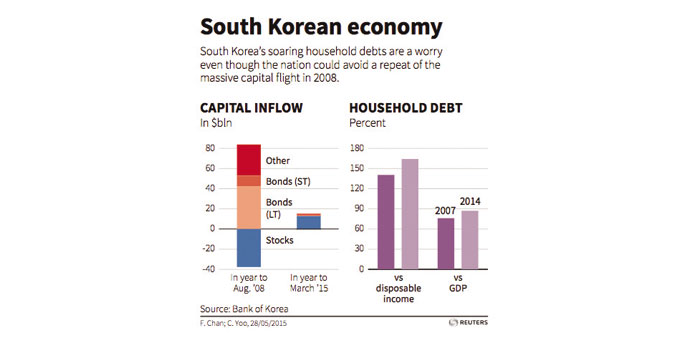Reuters/Seoul
Even as higher US interest rates pull funds out of emerging markets, South Korea will probably be spared from the upheavals caused by a massive capital flight in 2008, because it now has a smaller dependence on overseas funds. The worry for the economy is more domestic – the country’s mounting household debt.
Capital inflows – or net foreign investment in local stock and bond markets plus mostly short-term overseas loans – totalled $15.5bn in the year ended March. That’s just one-third of the $46.2bn seen a year before the Lehman Brothers collapse in September 2008 sparked the global financial crisis. The reduced capital flows into South Korea since then were due to a sharp drop in short-term overseas borrowings – classified as “other investment” in the international financial account – to $400mn from a whopping $31bn.
Helping to bolster its external outlook, South Korea’s foreign exchange reserves have risen to $362.8bn as of March from $258.1bn in June 2008. That means capital inflows in the year to March equalled just 4.3% of foreign reserves, far less than the 19% in 2008. Back then, a reversal of capital flows drained $55.4bn from South Korea in just five months, forcing the government to draw down billions of dollars from its reserves to defend the won . The currency plunged 30% to a then decade low against the dollar.
Now the risk to Asia’s fourth-largest economy is from within. The ratio of household debt to annual disposable income has risen to 164% at the end of last year from 141% at the end of 2007. The growing household leverage is one of the biggest among major economies, and is even bigger than that in the US right before the 2008 burst of its mortgage bubble. South Korea’s towering debts have put a lid on consumption growth and could undermine the global outlook for South Korea’s overall financial system, economists say.
“The economic problem of Korea is domestic,” said Raymond Yeung, senior economist at ANZ Banking Group in Hong Kong. “The looming household debt of almost 1,100tn won ($993.59bn) continues to hinder domestic demand.”

